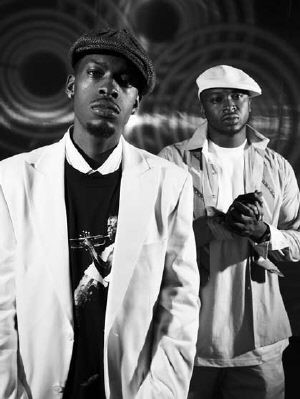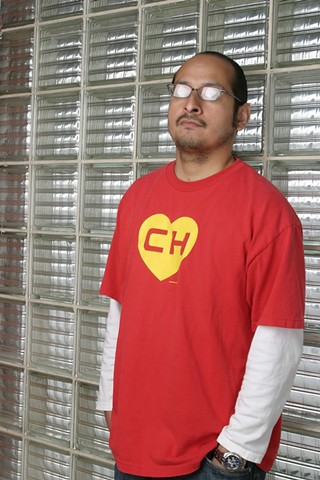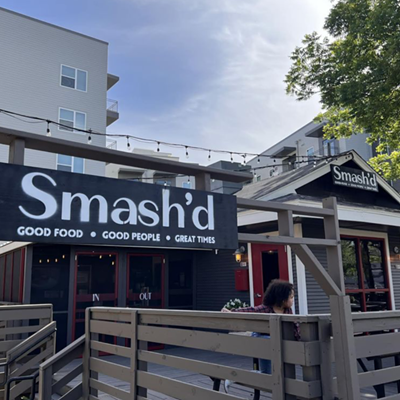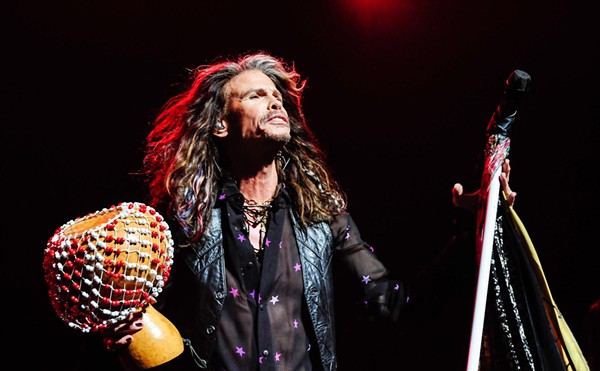| Got my Mojoe working: Peters and Scipio are set to re-release their debut album — with a few new touches. |
“Before we even finished the audition he stood up in the room and said ‘Stop, let’s do it,’” recalls Peters. “When the deal got finalized, we agreed to re-release the album. They remastered it with a New York mastering company to give it that industry quality.”
Fresh for 2006, Music World’s version of Classic.Ghetto.Soul. hits stores across the country on September 12. The new release is a polished version of the original album: Tracks have been rearranged, edited, and sometimes cut, resulting in a more cohesive musical journey and balanced flow. The disc also comes with a 16-page booklet containing all of the songs’ lyrics, rounding out this effort’s industry-level presentation. Working with Knowles has given Mojoe solid music-industry backing, and despite the producer’s reputation as an overbearing figure, the band has nothing but praise for him.
“He got a lot of stuff going on, but he’s always there for us,” says Scipio. “He’s always making sure that Mojoe is all right. He makes sure that in the office and at board meetings we are part of the topic. It’s not just something that he’s just trying to make money off of, and it’s different when your company or your boss feels you.”
From the beginning, Mojoe’s mission has been to bring soulful, cerebral, body-moving hip-hop to the masses. The group has taken to describing themselves as “the Roots meet OutKast over dinner with Marvin Gaye at D’Angelo’s house.” Back in 2003, the Roots were already Jay-Z’s backup band, OutKast was conquering the planet with Speakerboxx/The Love Below, and D’Angelo was missing in action. (Come to think of it, he still is.) Considering that Mojoe feels it has achieved significant growth in musicianship since 2003, one would expect Peters and Scipio to be frustrated about still covering the same material. That’s not the case, Peters says.
“We know the purpose `of` bringing the first one out is because a lot of people haven’t heard it, so it keeps us motivated as far as performing it,” says Peters. “Sometimes, as an artist, you have to challenge yourself to make sure you don’t get bored with your material. We find a way to mix in some new material, some mix-tape material, just songs that we’ve been doing to keep us entertained and to keep the audience entertained.”
To fill in the gaps for their core fans until their sophomore Music-World effort — the long-awaited Dirty Genes album — Mojoe has released the Under The Influence mix-tape, which seeks to align them with crews like the Soulquarians, Dungeon Family, and the OK Player camp. Idlewild, OutKast’s latest project, mirrors Classic.Ghetto.Soul.’s preoccupation with vintage forms of African-American musical expression, but there’s a difference, Scipio says: Mojoe was there first. “You got a new OutKast album that deals a lot of with blues and jazz, and it may sound really similar but we put that new sound out back in 2003,” he says. “I think people are definitely ready. You got Gnarls Barkley doing big things. I just think that right now people are starting to look for something deeper with their music. It’s gotta come back to the instrumentation.”
Ultimately, Mojoe hopes that the rerelease of its debut will connect the band with a global audience that isn’t obsessed with hip-hop focused solely on drugs, guns, and gems, and, perhaps, provide the Alamo City’s signature hip-hop sound. “I think if there’s any signature, it’s that San Antonio has been forced to be different and be original because people have taken so long to take notice,” Peters says. “There’s a lot of things built up inside of the artists. We have so much to talk about and so many ways to talk about `it`. Houston showed people why Texas is different, and I think San Antonio is gonna show people why Texas is special. The recipe right now for the San Antonio sound is originality.”



















